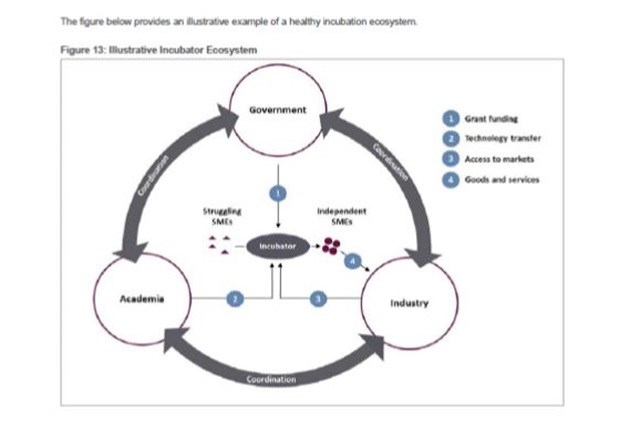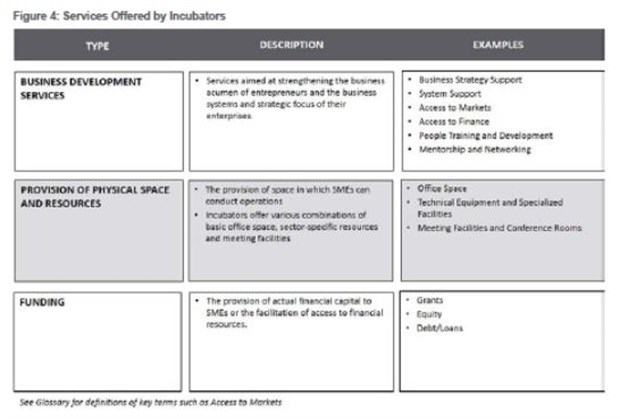





While Africa’s rate of growth has outperformed the global rate over the last decade, growth remains insufficient to provide jobs. The African Economic Outlook (2015) estimates 200 million people between the ages of 15 and 24 in Africa. This is the youngest population in the world and population growth remains rapid. The number of young people in Africa will double by 2045 and in 2050, 70% of the world’s population will come from Africa. Between 2000 and 2008, Africa’s working age population (15-64 years) grew from 443 million to 550 million, an increase of 25%. Left unattended, this will have serious economic and political repercussions, potentially resulting in large scale civil unrest and potential wars.
A McKinsey and Company Report (2011) provides insights into the growing demand for entrepreneurship to drive the global economy. With 12% of working age population engaged in early stage development of entrepreneurship and SME’s accounting for 52% of the Global Domestic Product (GDP), the outlook for entrepreneurship looks positive, but statistics reveal that 90% of start-up entrepreneurs fail within the first two - three years of business mainly due to a poor mind-set, lack of effective business and funding models.
So how can government support the growth and development of start-up entrepreneurs?
McKinsey’s highlights that the root cause lies in the early stage development of SMME’s, how they are enabled, created and sustained through their business lifecycle. Their report indicates the various factors impacting the entrepreneur and their success.
While the definition of entrepreneurship has changed significantly since it being defined in the 16th century, the purpose for entrepreneurship remains consistent, presenting the economic motivation and value creation drivers for entrepreneurs.
Respected global strategy academic authors agree that start-up entrepreneurship is critical to national economies as it contributes to job creation, productivity and economic growth. Interestingly, Chakravorti (2015) states while the mature world and business struggles through recession and recovery, 75% of the growth of global output will come from the emerging markets, pointing to nibble, fast paced and agile start-up entrepreneurs who can develop bottom up strategies and emerge as winners overnight.
Six centuries later, entrepreneurship has become a global phenomenon, spanning micro-entrepreneurs to visionary individuals creating global companies in less than ten years.
The Global Entrepreneurial Monitor, GEM (2006) which tracks the Total Early Stage Entrepreneurial Activity (TEA) reveals the average rate (per 100) adults engaged in business start-ups is 9.43%. Interestingly, the average increases when developing countries are grouped together and includes the countries of Peru (40.15%), the Philippines (44%), Thailand (15.20%), Brazil (11.65%), India (10.42%) and Chile (9.14%). Locally, by comparison, South Africa rated a mere average of 5.29%. Eight years later in 2014, the Total Early Stage Entrepreneurial activity statistics have shown positive increases in both developed and developing countries. Refer Figure 2.2.

Forbes Online, January 2015, points to successful factors for start-up entrepreneurs and statistics reveal that globally only a mere 10% of start-up entrepreneurs succeed and those that do include the following factors:
2. Good leadership
3. Market pull
Similarly, The Allan Gray Orbis Foundation (2014) commented on the 5th Global Economic Symposium (GES), in Morocco, themed “Harnessing the Power of Technology for Innovation and Entrepreneurship” that for entrepreneurship to succeed start-up entrepreneurs must -
2. Build reputation and credibility fast
3. Work on securing customers as soon as possibleInterestingly, this is contrary to the Global Economic Monitor (2014) which focusses more on business and finance models and leadership, revealing the levels of complexity, varied perspectives and opinions on what exactly constitutes the factors for start-up success.
According to McKinsey (2011), the 21st century belongs to the entrepreneur and underpinned by three pillars of success i.e. their ecosystem (or market environment), financing and culture. Countries that outperform their peers in these three areas collectively will succeed in entrepreneurship. This explains why entrepreneurs in developed countries experience higher success.
Similarly, The Global Entrepreneurial Monitor (2014) cites a country’s national economic framework as a factor for entrepreneurial success. It highlights that the success of entrepreneurship is directly linked to its local economic framework. It states three major motivating factors for entrepreneurship within countries and this is linked to the value drivers of the country’s economy such as factor driven economies, efficiency driven economies and innovation driven economies
The GEM 2014 report advocates The Entrepreneurial Framework Conditions (EFC), playing a significant role in solving the challenges for entrepreneurs, but still requires the entrepreneur to do the right actions to achieve the right results, profits and outcomes, confirming that actions are key to growth, development and success. Refer Figure 2.3. The report shows how developed countries are set up for success while developing economies struggle with challenges and obstacles that hinder their growth and development.
As an example of this is the fact that the South African government launched their first handbook for entrepreneurial incubators, sponsored by the United Nations Development Programme (UNDP), twenty years later when compared to developed economies. Refer Figure 2.4

For South Africa, the incubator support programme aims to assists SMME entrepreneurs in the start-up phase with support and services that will enable their growth and development, offering incentives for investment and support initiatives, but business models and methods are changing rapidly, fuelled by e-commerce and disruptive technology innovations.

According to respected academics, third world countries have caught up with first world countries on securing future trade agreements and protecting their markets. Initiatives such as BRICS (Brazil, Russia, India, China and South Africa) for developing countries are examples of such trade and market protection initiatives and real global alliances which influence purchasing and sales agreements between business and state.
These powerful trade agreements will have a direct impact on entrepreneurship opportunities that will direct and leverage business trade partner agreements and growth into the future.
For more information on how develop an effective entrepreneurial culture or how to reduce the failure rate of start-up entrepreneurship ventures in the 21st Century, kindly email moc.liamg@kywklahcsnavydnew.
